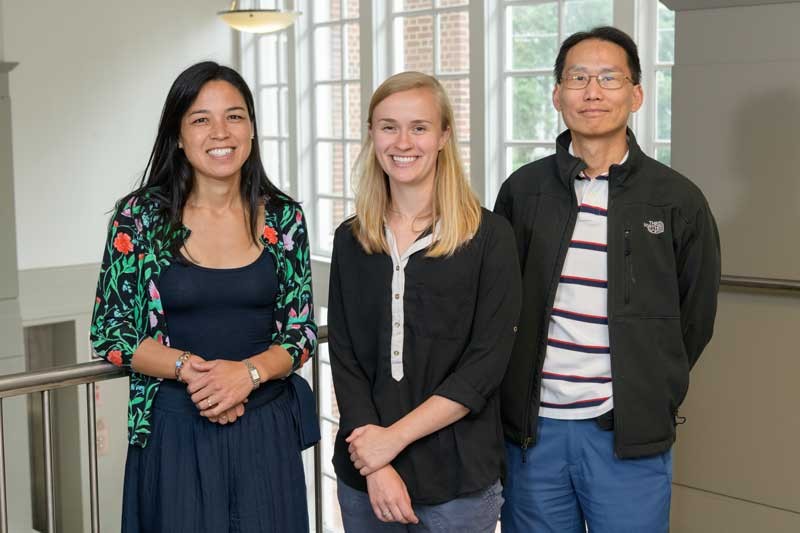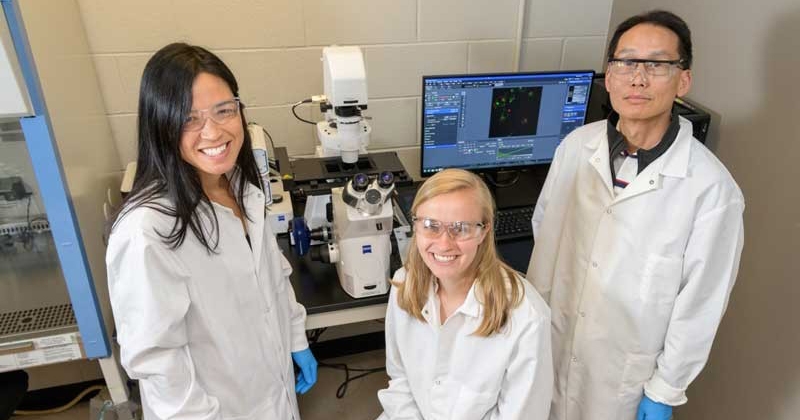For breast cancer research, engineering graduate student combines two labs’ expertise
Unlike most doctoral students, University of Delaware student Rachel Lieser has not one, but two faculty advisors.
One is Wilfred Chen, Gore Professor of Chemical Engineering, an expert in protein engineering. One is Millie Sullivan, Centennial Professor of Chemical and Biomolecular Engineering, an expert in biomaterials and drug delivery. The three of them are working together to develop better treatments for inflammatory breast cancer. So far, they have developed a technique that selectively kills cancer cells in a cell culture model. They utilize amino acids not found in nature to strategically deliver proteins to receptors on the surfaces of cancer cells. When the cells internalize these proteins, they produce a toxin that kill the cells from within—thus, the proteins act as ‘suicide enzymes.’
Lieser, Chen and Sullivan described their results in the journal Bioconjugate Chemistry in 2019, and for this work, Lieser won a Best of BIOT Award in Emerging Technology from the Division of Biochemical Technology (BIOT) of the American Chemical Society.
************
This research collaboration began a few years ago, after Chen and Sullivan attended a presentation by Kenneth Van Golen, an associate professor in biological sciences at UD and senior research scientist at the Helen F. Graham Cancer Center. Van Golen described his own research group’s studies of inflammatory breast cancer, which is difficult to treat and often deadly.
“Inflammatory breast cancer spreads quickly and mutates rapidly, and the gene expression patterns and cell phenotypes in this disease are quite unique,” said Sullivan. “Because the phenotypes of these cells are unusual, approaches to drug delivery that may work in other breast cancers may be totally irrelevant in inflammatory breast cancer. There is a need for both new types of therapeutic molecules and also new delivery strategies because the localization of this cancer is different and the biology of the cancer is different.”
After hearing Van Golen speak, Chen and Sullivan felt disappointed that inflammatory breast cancer is so commonly fatal, but they also felt inspired by the prospect of using their expertise to make a difference. Chen and Sullivan set out to design protein-based drugs for cancer therapy and figure out how to deliver them to cancer cells.
Protein-based drugs hold a lot of promise as cancer therapies because they are potent and have highly specific functions. However, proteins can be unstable and difficult to deliver to their intended targets—tumor cells. When treating cancer, doctors often need to control and localize the effects. The goal is for the drug to infiltrate cancer cells, but not healthy ones, in order to minimize treatment side effects.
The research groups have complementary expertise that is useful for solving these problems. Sullivan’s research group studies how to use nanoparticles, gels, or other biomaterials to encapsulate these potential drugs and change their properties so that they make it to the right places in the body. “Our lab has focused on developing materials that can be used to encapsulate and deliver some of the more complicated new types of drugs or medicines, things like DNA, RNA and now proteins, which are more difficult to use as medicines because they are more fragile and bigger and don’t go into and through cellular structures as readily as small molecules,” said Sullivan.
Chen’s work is focused on creating engineered proteins and engineered DNAs for a variety of applications, including delivery into the human body as medicines. “Based on what Millie had done so far in her lab, we would draw inspiration from her DNA and RNA delivery world to design a strategy toward improved protein delivery,” said Chen. “The combined expertise in both labs is what makes the whole system work.”
Chen and Sullivan applied for funding, and in 2015, they received a $450,000 grant from the National Science Foundation to develop DNA devices to target factors inside and outside cancer cells to strategically kill them.
Then, the pair of professors enlisted the help of Lieser, a Minnesota native who joined UD as a doctoral student in 2015 after graduating from Iowa State University with a bachelor’s degree in chemical engineering and a minor in bioengineering. As an undergraduate at Iowa State, Lieser studied polymer nanoparticles for drug delivery. Lieser is a fellow in the National Science Foundation IGERT program in Systems Biology of Cells in Engineered Environments (SBE2), a multi-disciplinary doctoral traineeship program for students interested in studying cells in engineered environments using the technologies and approaches of systems biology.
For Lieser, the opportunity to learn and apply two fields of expertise was appealing. “The biomolecular engineering field is becoming more and more multidisciplinary,” she said. “I liked the idea of learning about protein engineering in the Chen group and then applying it for drug delivery in the Sullivan group.”
A project of this scope is demanding. Lieser attends twice the group meetings of a typical doctoral student and spends plenty of time in the laboratory. When she started the project, she had never worked with unnatural amino acids, but she learned this and other techniques quickly. Next, Lieser is studying ways to use their system to deliver nanoparticle-based cancer therapies.

(l-r) Millie Sullivan, Rachel Lieser, and Wilfred Chen

